Answer these simple questions and we will find you the BEST prices
Which type of solar quotes do you need?
It only takes 30 seconds
100% free with no obligation



- GreenMatch
- Blog
- Should You Keep Your Windows Open When It’s Hot?
Should You Keep Your Windows Open When It's Hot?

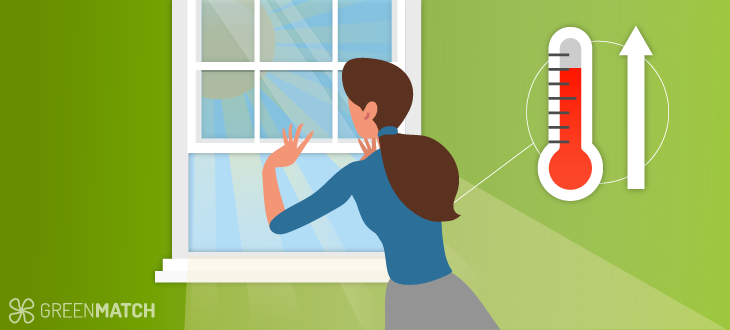
When the temperatures rise and things start to heat up indoors, we all look for some cooling relief by throwing open our windows - but is that the best thing to do? After all, that’s where the heat is coming from, right?
While opening windows can provide much-needed fresh air, it can also open up our homes to humidity and pollution and can even be a security risk. Depending on your location, climate and time of day, there are different steps you should take when it’s hot.
We asked the experts to find the best cooling solution in the hotter months. By speaking to industry professionals and cool-home enthusiasts, we’ve compiled a list of the best advice for all types of homes and scenarios.
1. Consider your environment
The decision to open or close windows in the summer depends on various factors, including climate, temperature, humidity levels, and personal preferences.
For those living in areas with high humidity or pollution, it may be better to keep windows closed and rely on air conditioning to maintain a comfortable indoor environment. Opening windows in hot and humid areas can increase humidity and make homes feel even warmer.
On the other hand, opening windows in areas with cooler summer temperatures can help cool down homes and allow fresh air to circulate. If you live in a cooler climate or have a well-insulated space, opening windows may be an effective way to reduce the need for air conditioning and improve indoor air quality. Opening windows can also improve overall comfort by creating a natural breeze and providing a sense of coolness.
Pay attention to your environment and health concerns to determine the best approach for maintaining a comfortable indoor environment during the summer.
2. Temperature and time of day

The best way to control the temperature inside your home is by taking action depending on the time of day. For example, a general rule is to leave the windows closed if the temperature outside your home is higher than inside. This will prevent extra heat from entering your home.
In contrast, the temperatures outside will generally be lower once the sun has gone down (or before it has risen). This is a great time to open your windows and get some cool air circulating.
Andrew Meyer, co-founder of Swell Energy, recommends the following:
Grab a digital thermometer or download an app when in doubt to see which is cooler. If the weather outside is hotter, then close your windows to trap the “cool” air in. On the other hand, if the inside of your house is hotter, usually in the early morning or late evening, then open them up to let a cool breeze in.
3. Humidity levels
Opening windows during hot weather in areas with high humidity can raise moisture levels inside your home, promoting the growth of mould and mildew. This can make maintaining a clean and comfortable indoor environment challenging, particularly for those with allergies or respiratory issues.
Corinne Segura, a Green Building Materials consultant, founder and writer at My Chemical-Free House, understands the negative effects of opening windows in humid weather:
Some institutions like Energy Star recommend your relative humidity not go higher than 50%, while many other experts like Mike Holmes recommend an upper limit of 60%. Above this, the humidity can contribute to indoor mould growth (and this could be behind walls, not necessarily visible).
To increase airflow when the humidity is high outside, consider installing an [...] air exchanger that modifies the humidity while overturning the air.
To prevent these issues, keeping windows closed in humid areas and considering investing in a dehumidifier to control moisture levels is recommended. Regular cleaning and maintenance can also help prevent mould and mildew growth.
4. Air conditioning and fans
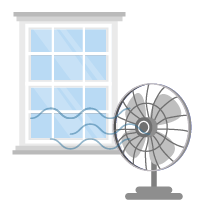
Using cooling appliances, such as air conditioners, fans or air to air heating can be a great way to reduce the temperature in your home. However, you should remember some important things if you use them.
To get the most from these appliances, it’s recommended that you keep windows shut when they are running, particularly if the temperature outside is warmer than inside. Heat will enter the home if windows are open, meaning your appliance won’t work effectively, but it will still cost you money on electricity bills.
Fans can make a greater difference during cooler times, such as first thing in the morning and late in the evening when the sun is down. When combined with open windows at these times, you can get a very effective cooling airflow through your home.
5. Energy bills
One of the most significant benefits of opening your windows during summer is reducing energy consumption. Air conditioning systems, or electric fans, require a lot of energy, and leaving them running for extended periods can result in high electricity bills, so opening windows instead can be a less expensive option.
It is worth noting, however, that if you choose to open windows and run a cooling appliance simultaneously, you will use a lot of energy trying to tackle the heat that is continuing to enter your home.
To balance energy consumption and comfort, it's best to keep your windows closed during the hottest parts of the day and rely on air conditioning or fans instead.
6. Air quality: Allergies and pollution
Opening windows can allow fresh air to circulate through your home, however, it's important also to consider the air quality in your area. Whether you live in an urban or rural area, there may be harmful or irritating pollutants in the air around you that you want to keep out of your home.
Joel Comino, founder & CEO of Next Modular, says:
If you live in an area where the air quality is poor, then having your windows open can introduce pollutants into your home. Pollen, mould spores, and other airborne irritants can enter through open windows and cause discomfort for those with allergies or asthma.
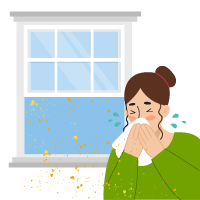
Suppose you, or someone in your home, suffers from allergies or respiratory issues. In that case, investing in a high-quality air purifier can help improve the indoor air quality whilst you keep the windows closed.
In addition to considering air quality, keeping windows open can also increase noise levels, potentially disrupting those working or studying from home.
Noise pollution can be a concern, especially in busy areas or near noisy streets. If noise is a significant issue, keeping windows closed or using soundproofing methods may be necessary to maintain a quiet and peaceful indoor environment.
If you decide to keep windows open, it's important to regularly dust and clean surfaces to prevent the accumulation of dirt and allergens that may enter through the open windows. This will help ensure your indoor environment remains fresh, healthy, and comfortable.
Read about the best way to clean windows.
7. Safety and privacy

It might go without saying, but it’s worth remembering that open windows can affect the safety and security of your home.
Ensuring all doors and windows are locked securely when you're not home can reduce the risk of burglary or break-ins.
If you live on the ground floor or with a higher crime rate, taking extra precautions, such as installing window locks or bars to secure your home further, is important.
Another consideration is your privacy. While open windows can allow fresh air and natural light to enter, they may also allow passersby or neighbours to see inside your home, making some people uncomfortable. If privacy is a concern, consider using blinds or curtains to block the view from the outside.
8. Pests

When keeping windows open in the summer, many people worry about bugs entering their homes. However, installing protective screens on windows and doors can easily address this concern.
Screens can effectively block out pests such as flies, mosquitoes, and wasps while allowing fresh air to circulate and cool down your home. Additionally, screens can help keep out unwanted visitors, such as birds and rodents.
Fresh air can also help keep pests at bay. By circulating and removing stagnant air, natural ventilation can create an inhospitable environment for many insects. Sunlight can also help discourage pests, as many insects prefer dark and humid environments.
To minimise the risk of pest problems while enjoying the fresh air, consider using natural repellents such as essential oils or citronella candles. These can help discourage pests from entering your home through open windows. It's also important to immediately clean up any food or water spills to avoid attracting unwanted visitors into your living space.
9. Ventilation
Proper ventilation is essential for maintaining a comfortable indoor environment, especially during hot and humid weather.
One of the easiest ways to achieve natural ventilation is to open windows and doors during cooler times of the day and close them when it gets warmer. It's also a good idea to use cross-ventilation by opening windows on opposite sides of the house, which will help fresh air flow through and circulate within the space.
One of the advantages of good ventilation is that it can help prevent condensation and mould development. Carl Lewis, owner and writer at The DIY Fix, highlights the widespread issues with dampness and mould:
According to the English Housing Survey 2019 to 2020, about 14% of homes in England had problems with damp, 50% reported problems with condensation.
A study conducted by the Scottish Government in 2018 found that 33% of Scottish households reported experiencing dampness or mould growth, 64% reported having problems with condensation.
A report published by the Welsh Government in 2017 found that 26% of homes in Wales had problems with damp and mould.
By letting fresh air circulate in, the current air and any humidity that is trapped in the air is removed. This improves indoor air quality and creates a more comfortable living environment for yourself and your family. It also reduces the risk of damp, condensation and mould growth.
10. Shading
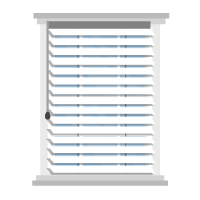
To combat rising temperatures in your home, installing shading devices such as blinds and curtains is important.
NHS advice recommends keeping sun-facing rooms as shaded as possible by keeping curtains shut, particularly between the hours of 11 am to 4 pm. Heavy fabric curtains, blinds or reflective window film can block out the sun's heat.
Blackout curtains can be a useful addition to retain the shade and further reduce heat. They provide an extra layer of protection in keeping the heat out of the room at night and keeping the room dark during the day to stop the sun from heating it.
11. Check your windows and conservatories

One of the first things to do when preparing for summer is to check your windows. Double-glazed windows can provide good insulation, but it's important to check for any damage or cracks that could compromise their performance.
Additionally, it's important to consider your window type and how it can be utilised for optimum airflow. Hinged windows are ideal for open ventilation but can be problematic if left open too long and invite pests inside. Sliding windows are great for keeping open during the summertime but must be regularly cleaned to prevent track blockage. Casement windows are another option for natural ventilation but can cause too much heat exposure to furniture.
If you have a conservatory, it's recommended that you keep the conservatory windows open during the day and isolate it from the rest of the house to reduce heat transfer. For example, conservatory windows should be kept open during a heatwave, and the door between the conservatory and the house should be kept closed. This prevents a “greenhouse effect” and causes extremely high heat levels to be trapped inside.
12. Insulation
Insulation serves as a barrier to prevent the entry of excess heat from the outdoors, which can disrupt the indoor temperature and increase energy consumption from air conditioning units.
Insulation materials like fibreglass, cellulose, and foam work by reducing heat transfer through conduction, convection, and radiation. By checking that your walls, roof, and floors are adequately insulated, you can prevent the buildup of excessive heat inside your home, leading to lower energy bills and a more comfortable living space.
13. Use landscaping
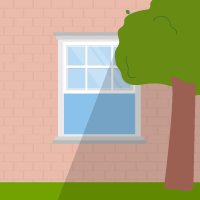
One effective way to reduce direct sunlight entering your home is by planting trees and shrubs around your property.
By strategically placing these natural elements, you can create a natural barrier that blocks the sun's rays and provides shade.
This will not only reduce the amount of heat that enters your home but also create a pleasant outdoor space for relaxation and recreation. Moreover, trees and shrubs also help purify the air by absorbing carbon dioxide and other pollutants and releasing fresh oxygen, making your environment healthier and more enjoyable.
However, Be mindful before planting that some plant species can cause allergies for those sensitive to pollen.
14. Better sleep and wellbeing
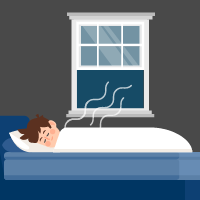
Opening windows can provide numerous benefits, including improved sleep quality and a connection to nature. Fresh air and a cool breeze help to relax the body, while a view of nature can enhance overall well-being and mood, particularly if living near water.
In addition, opening windows can benefit indoor plants, helping them to grow faster and stronger and improving indoor air quality by removing stale air and carbon dioxide build-up.
Sunlight and fresh air can also elevate our moods, leading to feelings of happiness and lightness.
Conclusions
The decision to keep windows open or closed during hot weather depends on individual circumstances, including location, climate, personal preferences, and tolerance for heat and noise levels.
When deciding, it's important to be mindful of factors like air quality, temperature, and energy efficiency. For instance, if outdoor pollution levels are high, keeping windows closed and relying on air conditioning may be best. However, if outdoor air quality is good and humidity levels are low, opening windows can greatly improve indoor air quality and save on energy costs.
By experimenting with different window configurations and utilising ventilation methods like fans and cross-breezes, you can find the best solution for your home that promotes a comfortable and healthy living environment.

Becky is an experienced SEO content writer specialising in sustainability and renewable trends. Her background in broadcast journalism inspires reliable content to help readers live more sustainably every day.
We strive to connect our customers with the right product and supplier. Would you like to be part of GreenMatch?





